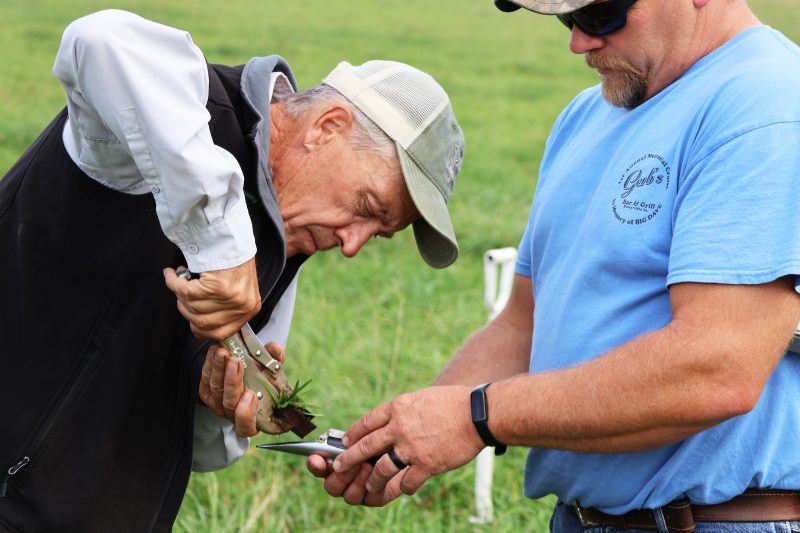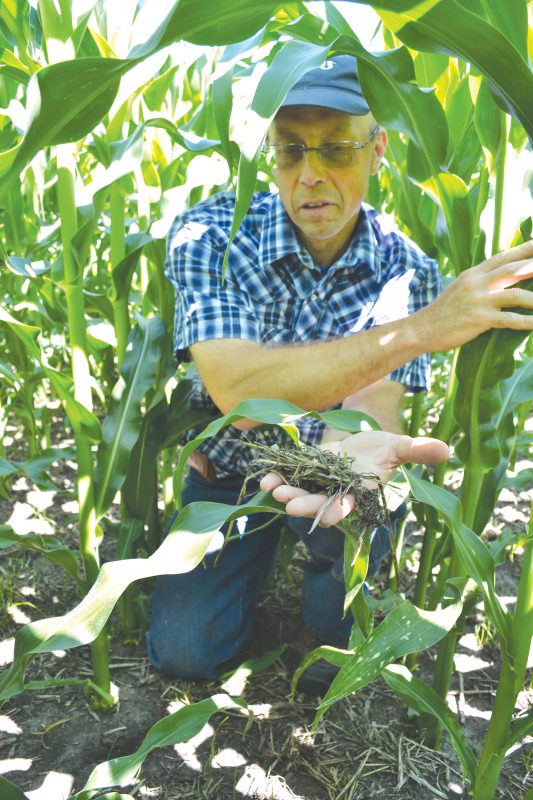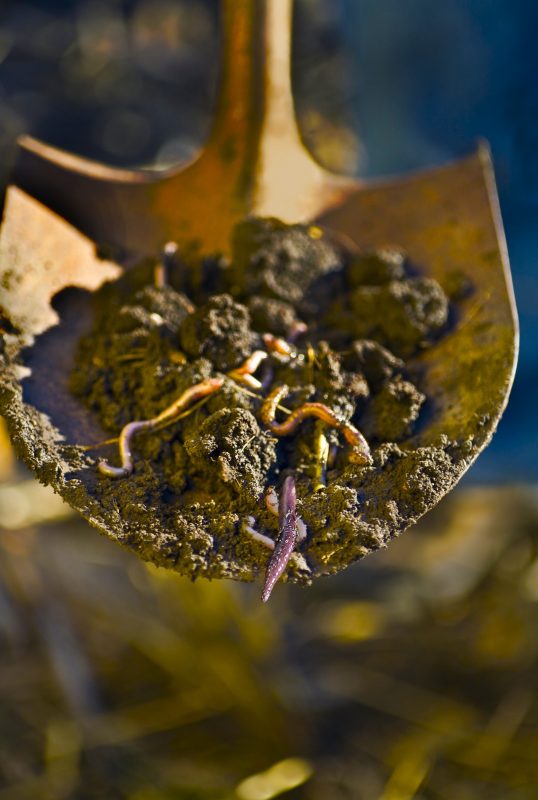Check out LSP’s ongoing Ear Dirt podcast series for conversations on cover cropping, no-till, managed rotational grazing, fungi, and just about anything else that builds soil health. You can check out all 373 episodes of our Ear to the Ground podcast here.
Ear to the Ground 370: Bending the Bird Curve
The feathered residents of America’s grasslands are in big trouble, but Audubon ecologist Krysten Zummo sees regenerative grazing as a way for bovines to benefit birds.
Ear to the Ground 367: Disrupting the Food Chain
Mastering the market is no easy task for a cutting-edge perennial grain. What lessons has Forever Green learned from its work with Kernza?
Ear to the Ground 366: Dynamic De-Riskers
Wendy Johnson is experimenting with Kernza because she believes in the power of perennials. And livestock are helping make this cutting-edge crop a little less of a gamble.
Ear to the Ground 365: Perennial Pivot
When Sogn Valley Farm transitioned out of intensive production of vegetable crops, it opened up opportunities to utilize a unique cousin of wheat as a way to steward the land.
Ear to the Ground 364: Savanna Symbiosis
Stephen Thomforde sees integrating trees, grass, and grazing animals as a way to support one of the most productive ecosystems in existence, and history backs up his argument.
Ear to the Ground 363: Small Grain-Big Opportunities
Landon Plagge’s experience growing oats has proven that this humble grain can play a big role in revitalizing soil health on corn-soybean farms. Can the milling facility he’s proposing do the same for rural communities? (Third in a three-part series on small grains and community-based foods.)
Ear to the Ground 362: Regenerative Return
When Roy Pfaltzgraff returned to his family’s northeastern Colorado cropping operation in 2016, he was committed to making farming a fulltime endeavor that built resilient soil, supported the community, and produced healthy food. (Second in a three-part series on small grains and community-based foods.)
Ear to the Ground 361: Additive Vs. Extractive
Bob Quinn says regenerative farming and rural economic revitalization go hand-in-hand. For him, it all started with a handful of “King Tut’s wheat.” (First in a three-part series on small grains and community-based foods.)
Ear to the Ground 359: Trash to Treasure
Soil conservationist Julie Reberg sees composting as a “very scientific art form” that can transform waste into biological bullion.
Ear to the Ground 358: Low Input – High Returns
Alex Udermann and his family at Meadowbrook Dairy were tired of working harder and harder for less and less. So they invested in building the kind of healthy soil that pays off economically, environmentally, and from a quality of life point of view.
Ear to the Ground 357: Against the Grain
As farmers from across the region haul corn past Allen and Kathleen Deutz’s farm to the local ethanol plant, they can’t help but notice fences, livestock, and a diversity of plants. What’s not as immediately evident is how this counter-intuitive way of farming is building long-term soil health and resilience.
Ear to the Ground 356: First Things First
Thinking of applying for NRCS funds? First, advises vegetable and livestock farmer Klaus Zimmermann-Mayo, figure out what kind of farming you want to do and how you want to do it.
Ear to the Ground 355: Silver Buckshot
Father-son team Joe and Matthew Fitzgerald are quite willing to share their insights with other farmers on how to get started in organic crop production. First piece of advice: sell your fishing boat.
Ear to the Ground 354: Great Expectations 
When Jay Fuhrer first started talking to his conservation colleagues about a different approach to protecting and building soil, he ended up eating lunch alone. But eventually the Burleigh County Soil Health Team helped launch a movement that’s showing how farming, the environment, and local economies benefit when people stop accepting soil as a degraded resource.
Ear to the Ground 353: 7 Years Later
Jon and Carin Stevens farm unforgiving land that leaves little room for mistakes. But thanks to a system based on no-till, cover cropping, and reintegrating livestock, a “victory year” has finally emerged from the ashes of failure.
Ear to the Ground 352: Land of the Living
Soil health expert Stephanie McLain has found that once farmers start seeking life in the bottom of a red Solo cup, there’s no turning back.
Ear to the Ground 351: Less Tillage, More Money
Jerry and Nancy Ackermann’s use of no-till and cover-cropping is building healthier soil, boosting beneficial bugs, and bolstering a positive financial bottom line.
Ear to the Ground 350: Cranking Up Capacity
By building soil biology via managed grazing, Langdon Collom is learning that expanding a farm’s capacity doesn’t always require horizontal expansion — sometimes you can simply go vertical.
Ear to the Ground 349: Family, Farming & Forages
Since taking over their family’s livestock operation, Parker and Sam Beard have added a few new twists. But one thing will never change: those hills will remain in grass.
Ear to the Ground 348: Urban Agrarian
Elyssa Eull’s tiny farm is tucked between railroad tracks and an empty lot in the heart of a major metropolitan area, but its city soil is producing food on a commercial scale.
Ear to the Ground 346: Pasture Pixie Dust
The NRCS’s Jeff Duchene has set up grazing plans in 50 Minnesota counties, and has yet to find that proverbial “magic grass.” But he’s more convinced than ever that good management and good planning are their own kind of silver bullet. (Fifth and last episode in a series on LSP’s 2024 Grazing School.)
Ear to the Ground 345: Grazing’s Generational Jump
Rick Matt was flat on his back when it became evident how he and his son, Damien, could build an intergenerational farming operation based on soil health, diversity, and grazing. (Fourth episode in a series on LSP’s 2024 Grazing School.)
Ear to the Ground 344: Flerd is the Word
Poor soil, short growing seasons, and little infrastructure: beginning farmer George Heller is proving that a successful grazing operation doesn’t require optimal conditions. (Third episode in a series on LSP’s 2024 Grazing School.)
Ear to the Ground 343: Healthy Soil Vs. Plastic Worms
Clifford Johnson calls himself an “honest regenerative hypocrite,” which says a lot about his approach to building soil health on his family’s crop and livestock farm. (Second episode in a series on LSP’s 2024 Grazing School.)
Ear to the Ground 342: Ignoring the Red Dress
Wholesome Family Farms is known for juggling enough enterprises to overwhelm even the most ambitious farmer. But Rachelle Meyer says a “three-legged stool” strategy keeps them balanced. (First episode in a series on LSP’s 2024 Grazing School.)
Ear to the Ground 338: Microbial IRA
For Jerome Fulsaas, cover cropping and no-till are creating an individual retirement account based on a living soil bank, not dead dirt.
Ear to the Ground 337: ROI & Riding a Bike
Josh Nelson’s approach to farming means looking beyond the next corn crop and building the kind of soil that generates long-term return on investment.
Ear to the Ground 336: Biology Booster
Gary Zimmer says before a farm can be sustainable, it has to be regenerated — and that starts with the soil.
Ear to the Ground 330: String Theory
Soil, cows, ecology, economics: to milk producer Derek Schmitz, they are all linked, and that feeds his optimism even as tough times cast a shadow over dairy farming.
Ear to the Ground 329: Weather Whiplash
Climate change may impact a vegetable producer and a livestock farmer in different ways, but the result is the same: uncertainty, stress…and a deeper desire to connect with community.
Ear to the Ground 327: Side-by-Side Soil
A 30-farm study is comparing the impacts regenerative vs. conventional practices have on soil’s resiliency. Extreme drought has churned up some exciting results.
Ear to the Ground 326: Rooting Out Nitrates 
The Olmsted County Groundwater Protection and Soil Health Program could serve as a holistic model for supporting practices that are good for the farmer, the land, and water quality.
Ear to the Ground 325: Return of the Fence
Matt and Seth Tentis of White Barn Acres are creating a soil-smart farm using a mix of livestock, continuous living cover, and experimentation — with a healthy dose of community support tossed in for good measure.
Ear to the Ground 324: Good Grass Makes Good Neighbors
The landowners Jeremy and Jessica Holst rent from like to see a green landscape — no wonder the dairy farmers’ rotational grazing system is considered a neighborhood asset.
Ear to the Ground 323: Rainy Day Fund
With their dairy farm at the epicenter of the worst drought in over a century, the Vergin family adapts through diversification, flexibility, and making deposits in the soil bank.
Ear to the Ground 321: Buried Knowledge
A town lost to erosion offers a critical lesson as Sandy and Lonny Dietz strive to develop a viable no-till organic vegetable production system.
Ear to the Ground 320: Season Stretcher
An innovative program for promoting soil health and extending the grazing season came at just the right time for farmer Alan Bedtka.
Ear to the Ground 318: Great Expectations
Farmer Mike Seifert is realizing that building a solid soil house is not enough — he also has to stock its pantry.
Ear to the Ground 316: Passing on Purity
Agronomist David Kleinschmidt says dealing with extreme weather on the farm requires compromise, even when it means taking a temporary step back on soil health.
Ear to the Ground 314: Going for the Goat
Jordan and Rachelle Meyer are using goats to add value to marginal land…one thistle at a time.
Ear to the Ground 313: Walking & Talking
A pasture walk on the Nikki and Cody Meyer farm shows the value of farmer-to-farmer learning.
Ear to the Ground 312: Testing in Nature’s Image
Dr. Liz Haney says a truly regenerative farming system starts with a regenerative way of measuring soil health.
Ear to the Ground 311: Mooching Means More
Humble Hands Harvest’s entry into agroforestry is being supported by its vegetable operation — setting the stage for a new approach to farming a rugged landscape long into the future.
Ear to the Ground 308: Is Your Farm a Business?
Dave Pratt says most farms and ranches are just a collection of expensive assets and low-paying jobs. But such a dysfunctional business model is not inevitable.
Ear to the Ground 303: Silvo Savvy
Farmers like Tom Hunter are setting out to prove that trees and livestock can mix in a way that creates an ecological -economic equilibrium.
Ear to the Ground 301: Pipe Dreams
When a tiling company suggested more pipe to deal with drainage issues, Tom Finnegan opted to go to the root of the problem.
Ear to the Ground 300: Diversity Trumps Adversity
Illinois farmer Dave Bishop says rural communities can’t “monoculture” their way out of the economic, ecological, and social challenges that plague them. But diversifying successfully isn’t just a numbers game.
Ear to the Ground 299: Road to Resilience
Laura Lengnick believes that if farms are to survive (and thrive) in the age of climate change, we need to remember it’s not just about soil and water — it’s also about people.
Ear to the Ground 297: Web of Willing Workers
Scientist Elaine Ingham believes minding the microbes makes farmers the masters of their own destiny.
Ear to the Ground 296: Stability is Sexy
Rick Clark’s no-till organic system is all about treating cover crops like cash crops — because they are.
Ear to the Ground 295: Patchwork Quilt Stewardship
John Ledermann’s rental relationships are built on healthy soil.
Ear to the Ground 292: Working the Microbes
David Johnson and Hui-Chun Su Johnson’s approach to composting may help farming reach the ultimate regenerative ag pinnacle: self-sufficient soil.
Ear to the Ground 291: Shovel Doesn’t Lie
What Allen Williams unearthed on the farm of Rachelle and Jordan Meyer.
Ear to the Ground 290: Silt Suppression
How the Bergler family stopped “chasing their tails,” started fixing their farm’s damaged soils, and welcomed curious queries.
Ear to the Ground 289: Reflections on a Revolution
Two decades after crop failures almost ended his farming career, soil health pioneer Gabe Brown reflects on how far the regenerative ag movement has come…and where it’s going.
Ear to the Ground 288: More with Less
Tom Cotter sees his return on investment tied directly to how freely he lets soil biology do its job — and that starts with a diverse community above and below ground.
Ear to the Ground 287: Opportunity Knocks
As an accountant and a farmer, Joe Lawler sees building soil health as a way to strike a balance between economic and ecological success…and boy is it fun to see a pollinator planting come to life.
Ear to the Ground 286: Tractor Seat Economics
Everett Rolfing knew one thing for certain: no-till would never work on his farm. His soil had a different idea.
Ear to the Ground 281: Report from the Underground
A journey into southeastern Minnesota’s geological basement reveals that building soil health can help make “clear” and “clean” equal the same thing.
Ear to the Ground 280: Maximum vs. Optimal
Adhering to the tenets of Ag Econ 101, a pair of beginning farmers are avoiding commodity row crops and embracing grazing, silvopasturing, and “bale grazed veggies.”
Ear to the Ground 279: We Are What We Eat
There’s a connection between the biome beneath our feet and the bounty on our table. Allen Williams thinks research linking soil health and nutrient density of food holds huge potential for advancing regenerative agriculture. (4th of 4 parts in a series)
Ear to the Ground 278: It Can Happen Anywhere
Allen Williams describes how regenerative practices are working on four farming operations representing widely divergent geographical locations and enterprises. (3rd of 4 parts in a series)
Ear to the Ground 277: 3 Regenerative Rules
Allen Williams asks, “What is a weed?” and lays out the three rules of adaptive stewardship. (2nd of 4 parts in a series)
Ear to the Ground 276: Why Regenerative Ag?
Allen Williams believes that farming in nature’s image isn’t just a nice idea, it’s an agricultural/ecological imperative. (1st of 4 parts in a series)
Ear to the Ground 274: From Dirt to Diversity
How Scott and Amanda Holthaus are transforming corn-soybean ground into perennial pasture utilizing soil biology and the rotational grazing of diverse cover crops.
Ear to the Ground 271: Focusing on Fungi
Maks Kopish is looking through a microscope and seeing a way for soil to be self-reliant.
Ear to the Ground 270: It Doesn’t Rain Grass
In an area that receives 8-10 inches of precipitation annually, Mexican rancher Alejandro Carrillo’s philosophy is: “It’s not how much rain you get, it’s what you do with it.” That’s why he makes sure that water falling out of the sky has a friendly reception on the ground.
Ear to the Ground 269: Soil’s Stairway to Heaven
Mike Seifert is using cover cropping and no-till to make up for the soil damage caused by years of heavy metal tillage. One rainy night, his headlamp illuminated the results.
Ear to the Ground 268: Rolling Down the CC River
A farmer, a soil conservationist, and a crops specialist talk about how the roller crimper system can help extend the benefits of a cover crop.
Ear to the Ground 267: Bringing Science Back to the Farm
A 4th grade experiment launched farmer Connor McCormick down a path of researching linkages between ecology, agricultural economics, and healthy soil.
Ear to the Ground 266: Activating Soil Life
How farmers involved in an LSP research project hope to use the Johnson-Su Bioreactor composting system to spark a chain reaction of underground ecological activity.
Ear to the Ground 260: Soil Health’s Long View 
Martin Larsen’s integration of small grains into his cropping operation is centered on building economic and ecological resiliency beyond the next growing season.
Ear to the Ground No. 259: Kernza’s Stress Test
In his ongoing attempt to create a regenerative, soil-healthy farm, Kaleb Anderson is pushing a plant science breakthrough further using rotational grazing
Ear to the Ground No. 257: The House that Biology Built
Tillage can do a lot of things, but building soil isn’t one of them. Soil expert Steve Lawler and Minnesota farmer Jon Jovaag talk about the importance of using nature as a guide when preparing a seed bed and bolstering the soil’s structure.
Ear to the Ground No. 256: From Sugar High to Soil Health
Soil health cheerleader Ray Archuleta and Iowa farmer Mervin Beachy talk about taking agroecological innovations from the “excitement stage” to the “action stage”…and the importance of aha moments.
Ear to the Ground No. 255: Embracing the Weed
What happened when beginning farmers Rachelle and Jordan Meyer started listening to the land and turned livestock loose on a “bacterial farm.”
Ear to the Ground No. 254: Mastering an Evolutionary Monster
Farmer Tom Frantzen talks about hybrid rye, ecological resiliency, and why being uncomfortable isn’t always a bad thing.
.